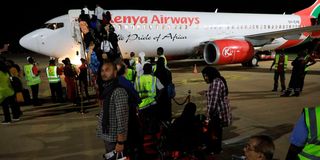It’s time we made travelling within Africa less expensive, complicated

Passengers board an aeroplane for the inaugural direct KQ flight to Dubai from Moi International Airport, Mombasa, on December 15, 2023.
As the very dedicated Kenyan tourist that I am, this year I again decided to travel within Africa.
Having visited Senegal, The Gambia and Nigeria in 2019 and Italy, Germany and Austria last year, I chose to travel to Angola, the Democratic Republic of Congo (DRC), Republic of Congo and also Burundi, the only East African country I had not been to.
The trip, however, turned out to be the most expensive and complicated compared to my several visits to Asia, Europe and the United States.
For instance, the requirements for an Angolan visa are akin to applying for the Schengen (Western European) one. The multiple-entry visa fee for DRC is $175 (about Sh24,850). To apply for a visa to the Republic of Congo, one requires an invitation from a local resident—even if you are a tourist—alongside express visa fees of $60 (Sh8,520).
Air tickets for Nairobi-Luanda-Kinshasa-Bujumbura-Nairobi round trip cost a whopping $3,300 (Sh326,600), which is more than double the cost of flying the same distance to Europe. A one-hour Angolan Airlines flight from Luanda to Kinshasa costs $600 (Sh85,200).
The most direct connection to Angola was by Ethiopia Airlines, flying from Nairobi to Addis Ababa in the north and then to Luanda in the south. The other viable alternative was Qatar Airlines, departing from Nairobi to Doha and on to Luanda.
As an alternative, one can opt for the Nairobi-Johannesburg route and then connect to Luanda, subject to flight availability. As for the Kinshasa-Bujumbura flight, the viable option was Uganda Airlines with a three-hour layover at Entebbe. As for Kenya Airways, the layover in Nairobi would have been 20 hours on my date of travel (April 14, 2023).
Certification and authentification of visas for foreigners arriving in Angola is another tedious bureaucratic process that kept us waiting for an hour before our entry could be processed.
After that, I ran into a serious language barrier as Angolans purely speak Portuguese. In the Republic of Congo, DRC and Burundi, I had the same problem as they mostly speak French, although the last two have a good number of Kiswahili speakers.
Cost of living
In addition, the cost of living in Angola, DRC and the Republic of Congo is beyond reach for many, even higher than in Europe. A four- or five-star hotel that costs $150 (Sh21,300) on average in Kenya is more than double the price. This also applies to basic commodities—made worse in the case of DRC, where the American dollar is the legal currency alongside the relatively valueless Congolese franc.
Having set out on a tour of Kinshasa, I chanced upon the Kenyan embassy, which became the first foreign mission I have ever visited abroad.
There, I did meet very distinguished diplomats in the name of Peter Owiti, the deputy head of mission, and Catherine Githinji, a foreign service officer. Both made me feel very much at home, having arrived the previous day from Brazaville, only seven minutes away by high-speed canoe across the large River Congo.
Quite evident is the multiple taxes payable at the border posts of DRC and the Republic of Congo along the river—unlike in Europe, where obtaining a Schengen visa becomes a free ticket to a cost-free movement across all the listed countries.
At N’djili Airport, in Kinshasa, one has to pay a one-of-a-kind tax of $55 (Sh7,810) before being cleared for departure. In Burundi, everything is smooth sailing, courtesy of the country being a member of the East African Community bloc. There are no visa requirements and entry is free.
The stringent Angolan visa requirements are, however, quite impressive and worth emulating as this speaks volumes about how protective a country is of its territory.
Opening up our borders to all and sundry, as is the case with Kenya, has more disadvantages than benefits. This is because we end up hosting many international criminals and rejects from other countries, which, in turn, impacts negatively the local indigenous populations, who have to fight for space even for their own businesses to thrive.
Mr Sumba is an advocate of the High Court of Kenya and a journalist. [email protected].





